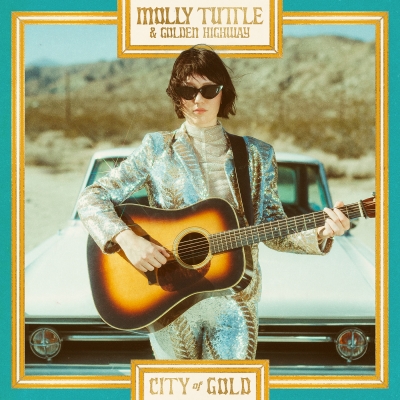Country Music Album Review: Molly Tuttle’s “City of Gold” — A Glittering Triumph
By Scott McLennan
These young musicians clearly embrace their roots, but there is no denying that this is a forward-looking troupe, one that flashes no pretensions as it blows your mind.
City of Gold, Molly Tuttle and Golden Highway (Nonesuch Records)
 Molly Tuttle is the pro-pot feminist psychedelic tale-spinning guitar virtuoso you need in your life right now.
Molly Tuttle is the pro-pot feminist psychedelic tale-spinning guitar virtuoso you need in your life right now.
Tuttle is on top her game on City of Gold, the follow-up to last year’s Grammy-winning Crooked Tree. The former builds on all that was great about the latter while it also offers even more fluid performances, given that it was made with the entirety of the outstanding Golden Highway ensemble. During the making of Crooked Tree, Tuttle was just gathering the members of Golden Highway together. At this point, Tuttle’s superb band — featuring mandolin player Domenic Leslie, fiddle player Bronwyn Keith-Hynes, bass player Shelby Means, and banjo player Kyle Tuttle (no relation to Molly) — has played more than 100 concerts. The chemistry has been exquisitely refined.
As with Crooked Tree, Tuttle shares the bulk of songwriting credits with Old Crow Medicine Show’s Ketch Secor. Once again, she has enlisted bluegrass dobro luminary Jerry Douglas as the new album’s producer.
It’s pretty nice that, at least for the moment, Tuttle has settled into specific musical territory. Previously, she had been casting about for a comfortable creative groove — looking for a spot that was neither too pop nor too traditional. Tuttle has won multiple big name awards for her guitar prowess, but she balances that skill with her obvious talents as singer, songwriter, and bandleader. This means she should be appreciated for her versatility rather than consigned to an easy label. That said, in terms of sound, City of Gold leans more toward the trad: the tracks accentuate acoustic instruments, a drumless bluegrass format, and country/folk arrangements. Still, her content does not lack for edge.
Tuttle launches the album with “El Dorado,” a sharply rendered depiction of gold-rush madness that can be easily applied to any of our modern crypto-fueled frenzies. Tuttle and Golden Highway deliver the narrative with an expansive sweep, giving each of the instruments a chance to have its moment in the spotlight.
“Where Did All the Wild Things Go” sounds as if it were crafted for the concert stage, but it is the rare party anthem that translates well to record. That’s because the song refuses to fall into a cookie-cutter arrangement. The track sounds more like it sprung from the kernel of John Hartford’s “Up on the Hill Where They Do the Boogie,” a song frequently covered by Golden Highway and sung by Kyle Tuttle (whom we assume delivers the well-placed grunt in “Wild Things”).
Speaking of cover songs, Tuttle and her band have been performing a frenetic version of Jefferson Airplane’s “White Rabbit” in concert. That seems to have been a warmup for the release of “Alice in the Bluegrass.” Tuttle supplies a wry and welcome update on the conventional use of “Alice in Wonderland” as source material for songs about feeding your head. You’ll catch plenty of nods to Grace Slick’s signature tune in this thoroughly enjoyable update.
And, speaking of drugs, Tuttle is on a roll paying homage to reefer. Tuttle sprinkles marijuana references throughout a few tracks, saving her most overt messaging for “Down Home Dispensary,” a song that sounds like a whistle-stop campaign song from a bygone era. It makes the case for legalizing marijuana in her adopted home state of Tennessee. And anyone who says pot slows you down needs to check out Tuttle’s blazing guitar solo in this one.
Tuttle’s political edge is more cutting on “Goodbye Mary,” a commentary on the political and legal movements under way to restrict women’s rights to control their bodies. The tragic story Tuttle tells in this haunting ballad sounds as if it could have come from an earlier time, which makes the analogy to current events all the more jarring. Note: Tuttle doesn’t need to scream to put her anger across here.

Molly Tuttle & Golden Highway. Photo: Chelsea Rochelle
And it should also be noted that Tuttle hardly casts all of her female leads as victims. Women call the shots in “Next Rodeo” and “Evergreen” (“Saddle up, not settle down”). The tender closing track, “The First Time I Fell in Love,” is a lilting reflection that sends a powerful message to any young woman who is feeling uncertain about being true to herself.
Throughout the record, Tuttle’s vocals, accented by her mastery of tone, are dazzling. “Yosemite,” performed with Dave Matthews as a duet partner, uses a road trip as allegory for a disintegrating romantic relationship. The tune’s teary metaphors are slung with the panache of classic country music weepers.
Romance fares better on “More Like a River,” which is an effective showcase for the band’s folksier side. By contrast, “When My Race Is Run” finds Tuttle channeling Keith Richards via her picking on acoustic guitar. The spectral ballad “Stranger Things” and roaring mandolin-and-fiddle-fueled train song “San Joaquin” round out this album’s offerings.
These young musicians clearly embrace their roots, but there is no denying that this is a forward-looking troupe, one that flashes no pretensions as it blows your mind.
Molly Tuttle and Golden Highway are scheduled to play at the Berklee Performance Center in Boston on Nov. 17.
Scott McLennan covered music for the Worcester Telegram & Gazette from 1993 to 2008. He then contributed music reviews and features to the Boston Globe, Providence Journal, Portland Press Herald, and WGBH, as well as to the Arts Fuse. He also operated the NE Metal blog to provide in-depth coverage of the region’s heavy metal scene.
Tagged: City of Gold, Golden Highway ensemble

